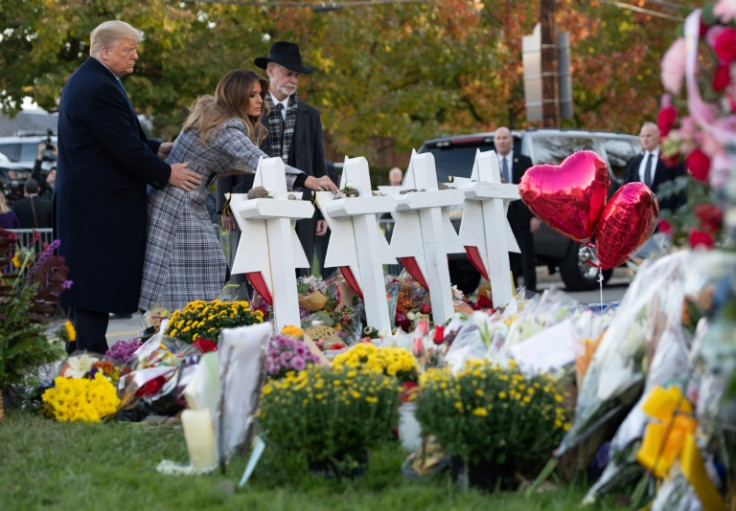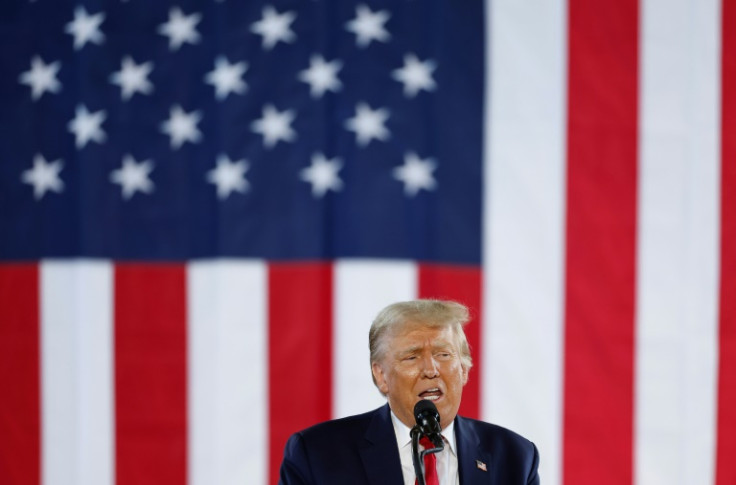Trump's Darkening Language Sparks Fears Of Violence
Donald Trump's populist, politically incorrect language is often framed as an asset but a troubling escalation in his incendiary rhetoric is prompting fears over the potential for violence among his inflamed supporters.

Donald Trump's populist, politically incorrect language is often framed as an asset but a troubling escalation in his incendiary rhetoric is prompting fears over the potential for violence among his inflamed supporters.
In recent days, the irascible former US president and 2024 candidate has implied that the country's top military officer should be executed and joked about the elderly husband of a political foe being attacked in a home invasion.
Critics say he hit a new low last week with comments about illegal immigrants so extreme that the Anti-Defamation League, a Jewish advocacy group, saw echoes of Nazi rhetoric.
"Nobody has any idea where these people are coming from, and we know they come from prisons, we know they come from mental institutions, insane asylums, we know they're terrorists," Trump told conservative news site The National Pulse.

"Nobody has ever seen anything like we're witnessing right now. It is a very sad thing for our country. It's poisoning the blood of our country."
The ADL's Jonathan Greenblatt told MSNBC television that Trump appeared to have been fed the line by someone familiar with Hitler's infamous complaint of Jews "causing a blood poisoning of Germany."
Trump's exhortations to violence are nothing new -- he suggested that protesters should be "roughed up" at a rally in 2016 and that looters should be shot during the 2020 racial protests over the police murder of George Floyd.
His months-long campaign of lies claiming that he had been cheated in his 2020 election loss culminated in addressing an angry crowd in Wasington on January 6, 2021, which then went and attacked the US Capitol.
Many participants in the ransacking of the seat of US democracy later told investigators that they considered that they were acting on Trump's orders.

Trump's inflammatory remarks used to shock America, generating days of coverage. His language no longer raises the stir it once did in a fatigued political and media establishment watching him cruise to the Republican nomination as the 2024 presidential election candidate.
Yet recent comments -- particularly his mocking of a hammer attack on the 83-year-old husband of Democratic former House speaker Nancy Pelosi, as well as a call for shoplifters to be shot on sight -- has provoked outrage.
Last week the judge in Trump's civil fraud trial in New York imposed a gag order after the Republican smeared a court clerk on social media and posted a link to her Instagram account.
Trump has also repeatedly described the attorneys leading the multiple civil and criminal cases he faces as "monster," "deranged" and "psycho." African American legal officials, he says, have been "racist."
The 77-year-old is often accused by opponents of "stochastic terrorism" -- an academic term meaning the public demonization of perceived adversaries to incite statistically probable but individually unpredictable acts of violence.
Many of Trump's targets in Congress and the government -- from Republican Senator Mitt Romney to recently retired top government scientist Anthony Fauci -- have disclosed having to take on private security after threats from the presidential candidate's supporters.
Greenblatt blamed the Republican tycoon's "racist, hateful, despicable" rhetoric about immigration in part for the massacres of Latinos and Jews in El Paso and Pittsburgh in 2018 and 2019 that left 34 people dead.
"Violent rhetoric leads to violent actions. And so this isn't (just) dangerous, it's explosive," he told MSNBC. "It's like lighting a fuse and just waiting for the bomb to go off."
Trump's comments about immigration "recall the worst racism of 1930s Germany," added Gerard Filitti, senior counsel at US-based Jewish and pro-Israel advocacy group The Lawfare Project.
"It is troubling that Donald Trump at times appears to use inflammatory rhetoric that injects a measure of divisive ethnonationalism into what would otherwise be straightforward discussions of policy," Filitti told AFP.
"Language like 'poisoning the blood of our country' is cringeworthy at best, and at worst sows doubt among voters as to what Trump's true beliefs are."
© Copyright AFP 2025. All rights reserved.





















